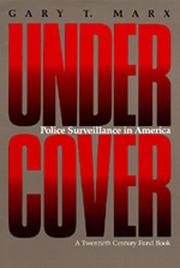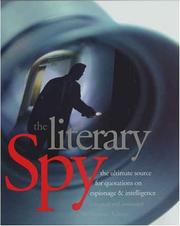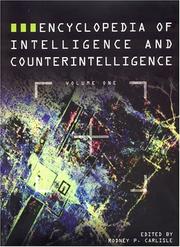| Listing 1 - 10 of 23 | << page >> |
Sort by
|
Book
ISBN: 9813363819 9813363800 Year: 2021 Publisher: Gateway East, Singapore : Springer,
Abstract | Keywords | Export | Availability | Bookmark
 Loading...
Loading...Choose an application
- Reference Manager
- EndNote
- RefWorks (Direct export to RefWorks)
Book
ISBN: 142142665X 9781421426655 9781421426648 1421426641 Year: 2018 Publisher: Baltimore
Abstract | Keywords | Export | Availability | Bookmark
 Loading...
Loading...Choose an application
- Reference Manager
- EndNote
- RefWorks (Direct export to RefWorks)
"In Equipping James Bond, Andre Millard provides readers with a hundred-year history of espionage technology through the lens of Ian Fleming's James Bond character and the gadgets integrated into both his novels and films. This book takes a wide-ranging look at factual (as well as fictional) technology, starting with the beginning of military aviation spanning through the contemporary threat of computer hacking. Millard views the fictional James Bond universe--and its wide popularity throughout the twentieth century--as evidence for both popular Whiggish perceptions of technological development as well as the borderline apocalyptic fear of technology's potential threats. As technology developed in the twentieth century, Millard contends, so did the gadgets of the James Bond universe--Bond and his adversaries evolved alongside rapidly developing technology. According to Millard, Bond, Ian Fleming, and the global fandom of the James Bond novels and films were simultaneously enthusiastic about triumphant perceptions of growth and technology and fearful of their potential ramifications"--
Espionage --- Covert operations (Espionage) --- Operations, Undercover (Espionage) --- Spying --- Undercover operations (Espionage) --- Intelligence service --- Spies --- Technological innovations. --- Bond, James

ISBN: 1282355678 9786612355677 0520910044 9780520910041 0520062868 0520069692 9780520062863 9781282355675 6612355670 Year: 1988 Publisher: Berkeley University of California Press
Abstract | Keywords | Export | Availability | Bookmark
 Loading...
Loading...Choose an application
- Reference Manager
- EndNote
- RefWorks (Direct export to RefWorks)
Providing a rich picture of past and present undercover work, and drawing on unpublished documents and interviews with the FBI and local police, this penetrating study examines the variety of undercover operations and the ethical issues and empirical assumptions raised when the state officially sanctions deception and trickery and allows its agents to participate in crime.
Police patrol --- Criminal investigation --- Undercover operations --- Physical surveillance (Police work) --- Police surveillance (Patrol work) --- Surveillance in police work --- Surveillance operations. --- academic. --- american history. --- crime. --- criminal justice. --- criminal. --- detective work. --- ethical issues. --- ethics. --- fbi. --- fieldwork. --- issues in policing. --- justice system. --- local police. --- morals. --- police brutality. --- police department. --- police ethics. --- police tactics. --- police work. --- research. --- scholarly. --- undercover cop. --- undercover detective. --- undercover investigation. --- undercover police. --- undercover.

ISBN: 1281729256 9786611729257 0300128924 0300103247 9780300103243 9780300128925 9781281729255 6611729259 Year: 2004 Publisher: New Haven Yale University Press
Abstract | Keywords | Export | Availability | Bookmark
 Loading...
Loading...Choose an application
- Reference Manager
- EndNote
- RefWorks (Direct export to RefWorks)
The Literary Spy provides a unique view of the intelligence world through the words of its own major figures (and those fascinated with them) from ancient times to the present. CIA speechwriter and analyst Charles E. Lathrop has compiled and annotated more than 3,000 "ations from such disparate sources as the Bible, spy novels and movies, Shakespeare's plays, declassified CIA documents, memoirs, TV talk shows, and speeches from U.S. and foreign leaders and officials. Arranged in thematic categories with opening commentary for each section, the "ations speak for themselves. Together they serve both to illuminate a world famous for its secrets and deceptions and to show the extent to which intelligence has manifested itself in literature and in life. Engaging, informative, and often irreverent, The Literary Spy is an exceedingly satisfying book-one that meets the needs of the serious researcher just as ably as those of the armchair spy in pursuit of an evening's entertainment.
Espionage --- History, Modern --- Modern history --- World history, Modern --- World history --- Covert operations (Espionage) --- Operations, Undercover (Espionage) --- Spying --- Undercover operations (Espionage) --- Intelligence service --- Spies
Book
ISBN: 1476645949 Year: 2022 Publisher: Jefferson : McFarland & Company, Incorporated Publishers,
Abstract | Keywords | Export | Availability | Bookmark
 Loading...
Loading...Choose an application
- Reference Manager
- EndNote
- RefWorks (Direct export to RefWorks)
"This thrilling story memorializes one of the most dangerous--and successful--series of undercover operations conducted by the Bureau of Alcohol, Tobacco, Firearms and Explosives. Written by the ATF special agent who took these operations from disrupting small time fencing schemes to infiltrating major criminal organizations, this book is the first time that the true story of these secretive operations will be told. During the operation's run from 2006-2014, Lou Valoze's fictitious businesses allowed his team of undercover agents to take thousands of weapons out of circulation and millions of dollars of drugs off the street. Through these covert "storefront" operations, the author developed a unique investigative blueprint for removing guns from the hands of violent felons, gang members, organized crime members and drug dealers. This book also explores the dark reality of living a double life and how it becomes difficult to tell the difference between the good guys and bad guys"--
Undercover operations --- Violent crimes --- Prevention. --- Valoze, Lou, --- United States. --- Officials and employees

ISBN: 1317471776 1315704749 1849724776 9781317471776 9781849724777 9780765680686 0765680688 0765680688 9780765680686 9781315704746 9781317471752 9781317471769 1317471768 Year: 2005 Publisher: Armonk Sharpe Reference
Abstract | Keywords | Export | Availability | Bookmark
 Loading...
Loading...Choose an application
- Reference Manager
- EndNote
- RefWorks (Direct export to RefWorks)
From references to secret agents in The Art of War in 400 B.C.E. to the Bush administration's ongoing War on Terrorism, espionage has always been an essential part of state security.policies. This illustrated encyclopedia traces the fascinating stories of spies, intelligence, and counterintelligence throughout history, both internationally and in the United States. Written specifically for students and general readers by scholars, former intelligence officers, and other experts, Encyclopedia of Intelligence and Counterintelligence provides a unique background perspective for viewing history and current events. In easy-to-understand, non-technical language, it explains how espionage works as a function of national policy; traces the roots of national security; profiles key intelligence leaders, agents, and double-agents; discusses intelligence concepts and techniques; and profiles the security organizations and intelligence history and policies of nations around the world. As a special feature, the set also includes forewords by former CIA Director Robert M. Gates and former KGB Major General Oleg Kalugin that help clarify the evolution of intelligence and counterintelligence and their crucial roles in world affairs today.
Intelligence service --- Espionage --- Covert operations (Espionage) --- Operations, Undercover (Espionage) --- Spying --- Undercover operations (Espionage) --- Counter intelligence --- Counterespionage --- Counterintelligence --- Intelligence community --- Secret police (Intelligence service) --- Spies --- Public administration --- Research --- Disinformation --- Secret service --- Service des renseignements --- Espionnage --- Encyclopedias --- Encyclopédies
Book
ISBN: 128249970X 9786612499708 0810863022 9780810863026 9780810859531 081085953X Year: 2009 Publisher: Lanham, Md. Scarecrow Press
Abstract | Keywords | Export | Availability | Bookmark
 Loading...
Loading...Choose an application
- Reference Manager
- EndNote
- RefWorks (Direct export to RefWorks)
The Historical Dictionary of Middle East Intelligence addresses intelligence issues in the region from ancient history and the Middle Ages through modern times, covering the decline of the Ottoman Empire, intelligence activity in the Middle East during and between the two world wars, and the interplay between colonial and local intelligence and counterintelligence agencies of the period. It also presents the relatively new fundamentalist terrorist organizations that have had a significant impact on international relations and on the structure and deployment of intelligence, counterintelligence
Military intelligence --- Intelligence service --- Espionage --- Counter intelligence --- Counterespionage --- Counterintelligence --- Intelligence community --- Secret police (Intelligence service) --- Public administration --- Research --- Disinformation --- Secret service --- Information warfare --- Deception (Military science) --- Covert operations (Espionage) --- Operations, Undercover (Espionage) --- Spying --- Undercover operations (Espionage) --- Spies --- History
Book
ISBN: 1784501360 9781784501365 9781849056434 1849056439 Year: 2016 Publisher: London
Abstract | Keywords | Export | Availability | Bookmark
 Loading...
Loading...Choose an application
- Reference Manager
- EndNote
- RefWorks (Direct export to RefWorks)
Providing authoritative information on the practicalities of using hidden cameras to expose abuse or wrongdoing, this book is vital reading for anyone who may use or encounter secret filming. It gives specific advice on using phones or covert cameras and unravels the complex legal and ethical issues that need to be considered.
Electronic surveillance. --- Hidden camera photography. --- Undercover operations. --- Covert investigation (Criminal investigation) --- Covert operations (Criminal investigation) --- Operations, Undercover --- Sting operations --- Criminal investigation --- Photography --- Electronics in surveillance --- SIGINT (Electronic surveillance) --- Signals intelligence --- Surveillance, Electronic --- Remote sensing
Book
ISBN: 9781849287296 1849287295 9781849287302 1849287309 9781849287289 1849287287 Year: 2015 Publisher: Cambridgeshire, England : IT Governance Publishing,
Abstract | Keywords | Export | Availability | Bookmark
 Loading...
Loading...Choose an application
- Reference Manager
- EndNote
- RefWorks (Direct export to RefWorks)
The Tao of Open Source Intelligence The Internet has become the defining medium for information exchange in the modern world, and the unprecedented success of new web publishing platforms such as those associated with social media has confirmed its dominance as the main information exchange platform for the foreseeable future. But how do you conduct an online investigation when so much of the Internet isn’t even indexed by search engines? Accessing and using the information that’s freely available online is about more than just relying on the first page of Google results. Open source intelligence (OSINT) is intelligence gathered from publically available sources and is the key to unlocking this domain for the purposes of investigation. Product overview The Tao of Open Source Intelligence provides a comprehensive guide to OSINT techniques, for the investigator: It catalogues and explains the tools and investigative approaches that are required when conducting research within the surface, deep and dark webs. It explains how to scrutinize criminal activity without compromising your anonymity – and your investigation. It examines the relevance of cyber geography and how to get around its limitations. It describes useful add-ons for common search engines, as well as considering metasearch engines (including Dogpile, Zuula, PolyMeta, iSeek, Cluuz, and Carrot2) that collate search data from single-source intelligence platforms such as Google. It considers deep-web social media platforms and platform-specific search tools, detailing such concepts as concept mapping, entity extraction tools, and specialist search syntax (Google kung fu). It gives comprehensive guidance on Internet security for the smart investigator, and how to strike a balance between security, ease of use, and functionality, giving tips on counterintelligence, safe practices, and debunking myths about online privacy. OSINT is a rapidly evolving approach to intelligence collection, and its wide application makes it a useful methodology for numerous practices, including within the criminal investigation community. The Tao of Open Source Intelligence is your guide to the cutting edge of this information collection capability. About the author Stewart K. Bertram is a career intelligence analyst who has spent over a decade working across the fields of counterterrorism, cybersecurity , corporate investigations and geopolitical analysis. The holder of a master’s degree in comput...
Espionage. --- Covert operations (Espionage) --- Operations, Undercover (Espionage) --- Spying --- Undercover operations (Espionage) --- Intelligence service --- Spies --- Open source intelligence. --- Intelligence, Open source --- OSCINT (Open source intelligence) --- OSINT (Open source intelligence) --- ONIST. --- intelligence. --- open source intelligene. --- open source. --- tao.
Book
ISBN: 9780822982418 0822982412 9780822944737 0822944731 Year: 2018 Publisher: Pittsburgh
Abstract | Keywords | Export | Availability | Bookmark
 Loading...
Loading...Choose an application
- Reference Manager
- EndNote
- RefWorks (Direct export to RefWorks)
Everything we know about what goes on in the world comes to us through reports, information transmitted through human communication. This book offers a clear, accessible introduction to the theory of reporting, with a special emphasis on national security, particularly military and diplomatic reporting, drawing on examples from historical accounts of espionage and statecraft from the Second World War.
Espionage. --- Military intelligence. --- Reporters and reporting. --- Knowledge, Theory of. --- Epistemology --- Theory of knowledge --- Philosophy --- Psychology --- Newspaper reporting --- Journalism --- Newspapers --- Information warfare --- Intelligence service --- Deception (Military science) --- Covert operations (Espionage) --- Operations, Undercover (Espionage) --- Spying --- Undercover operations (Espionage) --- Spies
| Listing 1 - 10 of 23 | << page >> |
Sort by
|

 Search
Search Feedback
Feedback About UniCat
About UniCat  Help
Help News
News